Oh, Give Me a Home, Where the Sheep and the Penguins Roam
The Falkland Islands are a wildlife sanctuary turned organic farm
Oh, Give Me a Home, Where the Sheep and the Penguins Roam
The Falkland Islands are a wildlife sanctuary turned organic farm
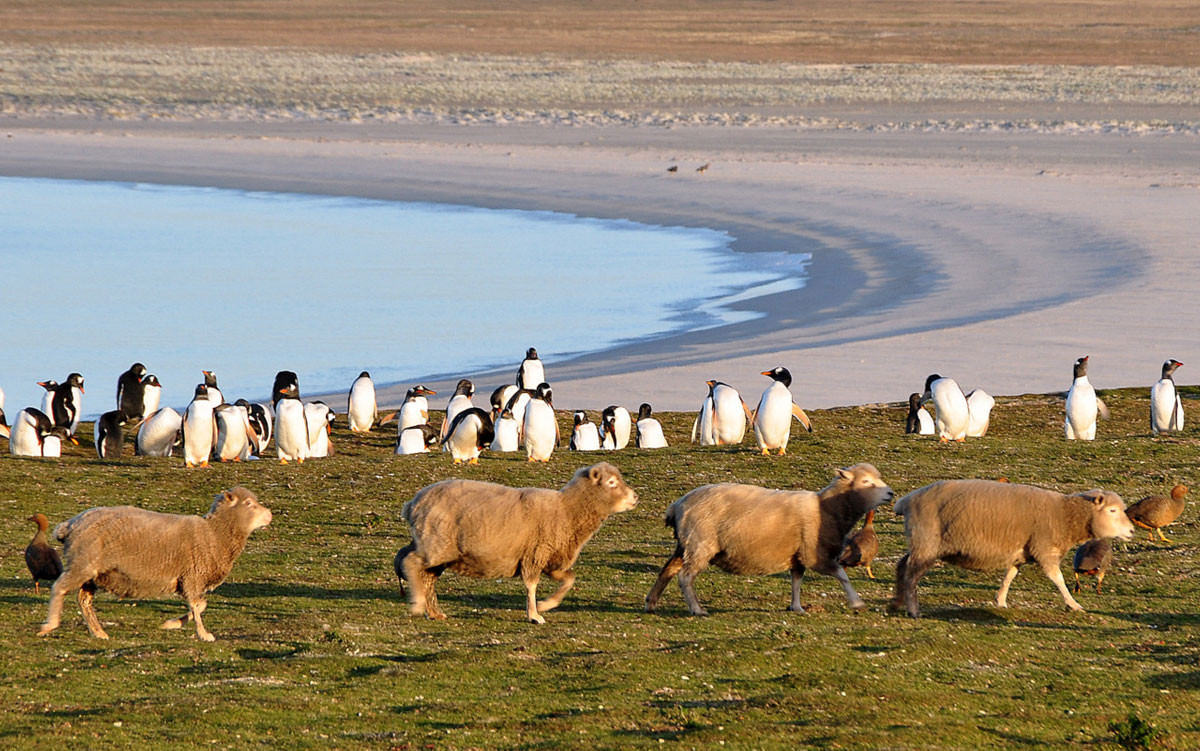
While it may sound like a mythical place, the Rendells’ ranch is no different from the neighboring farms scattered throughout the Falkland Islands, a tiny windswept archipelago about 850 miles north of the Antarctic Circle and 400 miles east of Argentina.
Home to around 3,000 people and roughly half-a-million sheep, the Falklands, a British territory, are a major wool producer. Besides being one of the only places in the world where sheep and penguins routinely share pasture, the Falkland Islands bear the distinction as the nation with the highest percentage of certified organic land. In the late 1990s, the local government pushed to get the entire group of islands certified organic as a way to boost the brand of Falkland Islands’ wool on the international market. Today, 36 percent of Falklands farmland is certified organic, and the extraordinarily fine, ultra-white Polwarth wool they export has a cult following among textile artists.
The Rendells purchased their farm, which occupies the entirety of Bleaker Island (one of the nearly 800 islets that comprise the Falklands archipelago) 16 years ago, though it has a been farmed continuously for more than 100 years. Mike Rendell says becoming certified organic was simply a matter of paperwork for he and his fellow Falklands ranchers because there was virtually no use of agricultural chemicals or livestock antibiotics on the islands. Serving organic steaks is one of the small luxuries afforded to tourists who come to stay in the Rendells’ solar- and wind-powered guest house.
“Although we weren’t certified organic until six or seven years ago, in fact we were always organic because we weren’t using anything other than natural products,” says Rendell, adding that “our livestock are all grass-fed.”
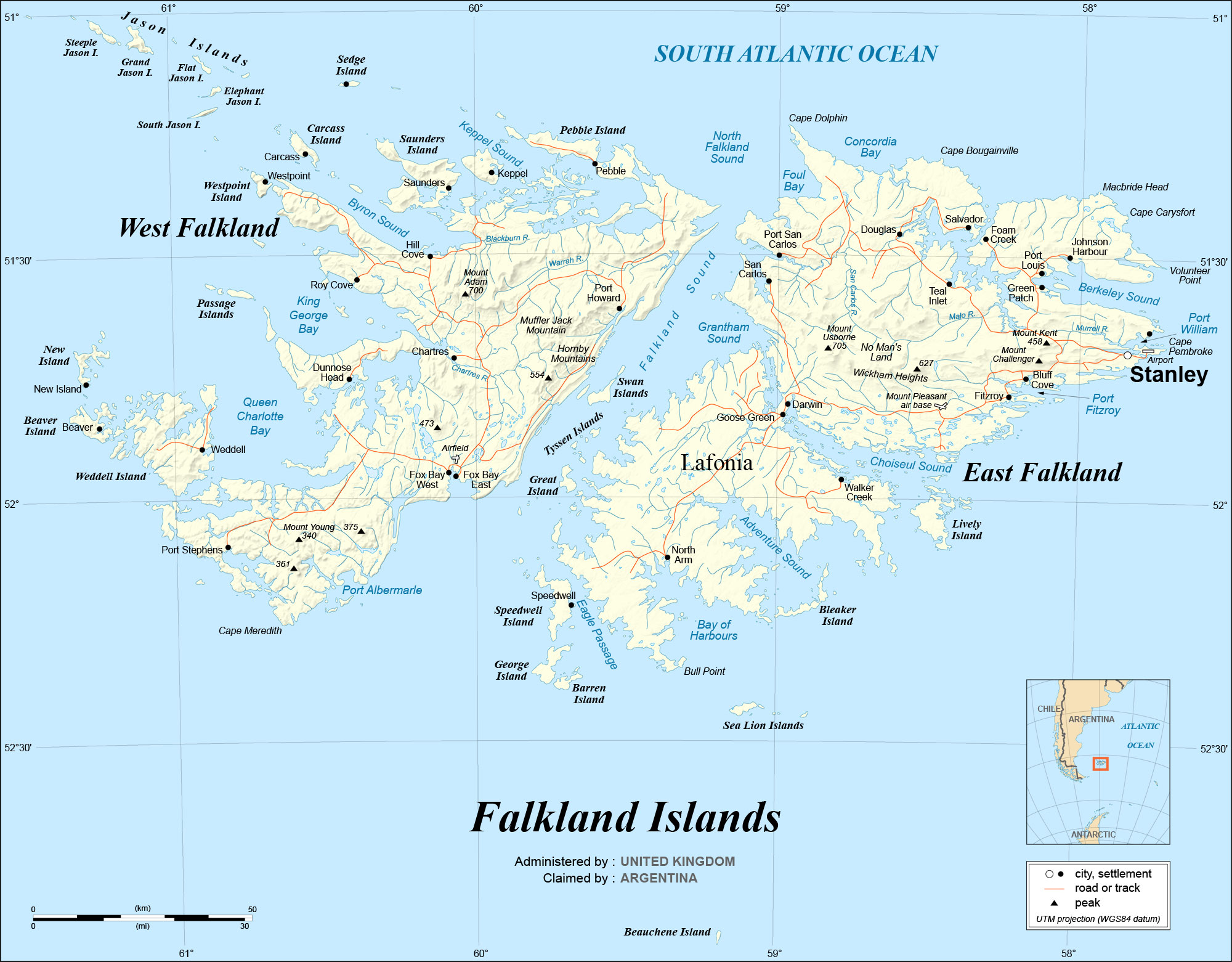
The sheep and cattle on Bleaker Island and elsewhere in the Falklands subsist largely on the native tussac grass, which grows in clumps up to 8 feet tall and forms extensive stands along low-lying coastal areas throughout the Falklands. In addition to providing year-round forage to the sheep and cattle, tussac swards serve as nesting grounds for local seals, along with 46 of the 65 bird species that call the islands home, including Magellanic penguins, which excavate subterranean burrows beneath the grass. The richness of the tussac ecosystem is the reason that wildlife and livestock are so commonly found cohabitating in the Falklands.
The habitat-sharing arrangement seems to work well for all parties involved. “You’ll see sheep walking right through the middle of the penguin colony, and the penguins don’t even turn a head,” says Rendell, laughing. “You don’t see a cow going up and licking a penguin or anything like that, they just get on with their own lives. They don’t seem to have any issues at all.”
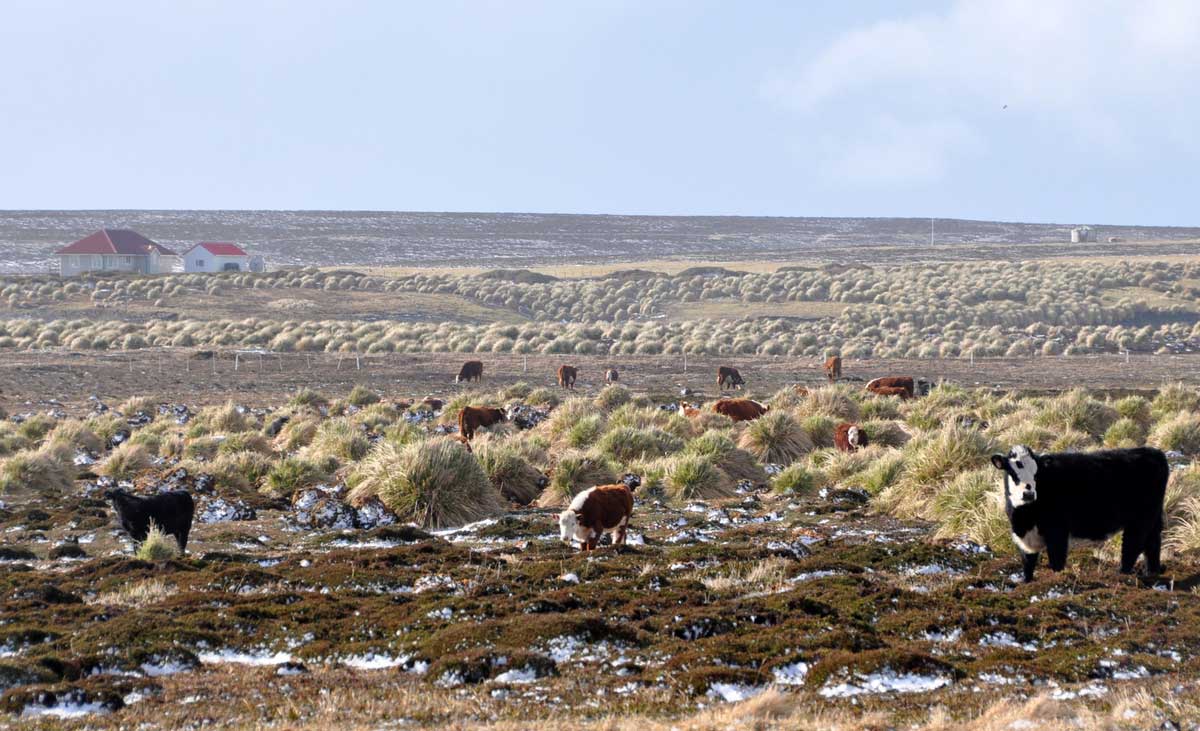
In the past, however, there was an issue of too many sheep and not enough tussac. Bleaker Island was overstocked when they bought it, says Rendell, who has slashed the size of the herd by more than a third to ensure that the tussac can regrow enough each year to provide for both the livestock and wildlife.
In other areas of the world, the commingling of livestock and wildlife has led to devastating disease outbreaks as a result of pathogens jumping from one host species to another. But Rendell says this has never been an issue in the Falklands in part because ruminants aren’t closely related to seabirds, penguins, or sea lions, but also because livestock in the islands rarely suffer from disease. “The livestock here is in very good condition in terms of disease because we are so insulated from the rest of the world,” says Rendell.
The islands’ geographic isolation helps prevent the introduction of exotic pathogens, but the Falkland’s government maintains strict protocols to avoid contagion from abroad. When the Rendells brought in Hereford steers from Chile to start their cattle herd 10 years ago, the animals went through “a very serious quarantine regime over about four or five months. Lots of testing and all sorts of things had to happen,” Rendell says.
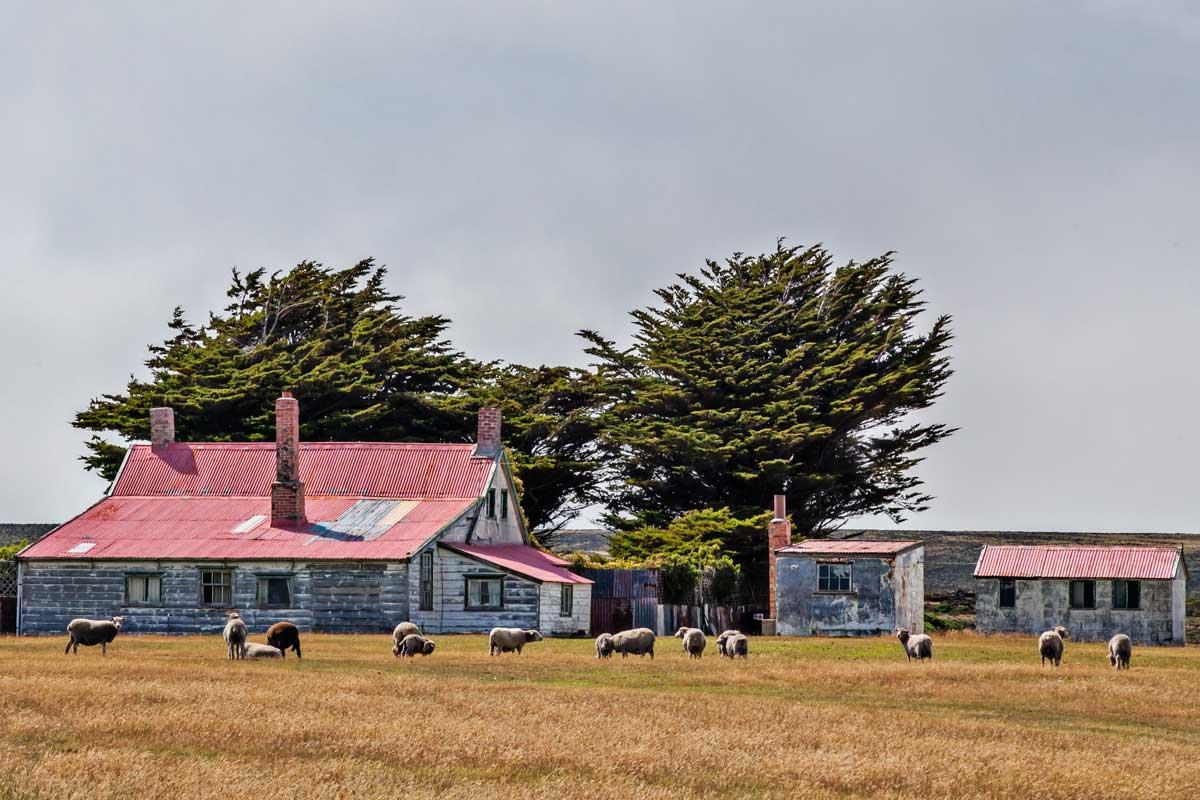
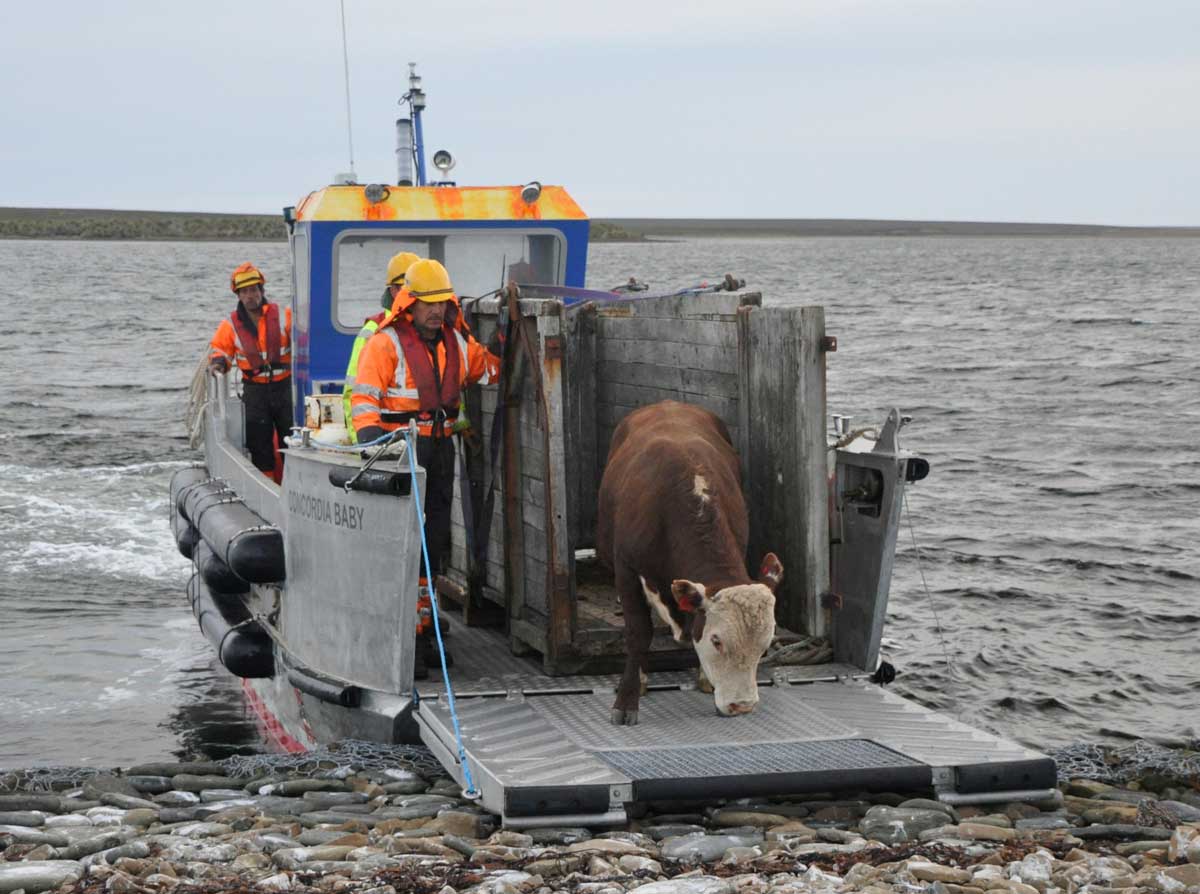
Ample grasslands, low-stocking densities, and nearly nonexistent disease pressure has made organic methods the default approach of Falkland’s ranchers. In the Falklands, there is no need for sheep dipping, where the animals are literally bathed in potent parasiticides, nor mulesing, the controversial practice of removing the skin from the backsides of lambs to avoid the fly (and maggot) infestations that can build up in dung-encrusted fur when sheep live in unsanitary conditions – neither of which are permitted under organic standards.
While the Falklands may sound like a pastoral paradise, there are drawbacks to living and farming in such a remote place. Supplies come only every six weeks to Bleaker Island, via an expensive eight-hour boat ride from Stanley, the capital. The same boat delivers new breeding stock to improve the genetics of the herd, and carts off animals to the Falkland’s only abbatoir. Corralling livestock onto a beached boat isn’t easy, says Rendell.
Yet getting humans back and forth to East Falkland Island where Stanley is located – what folks like the Rendells who live on the many remote islets refer to as “the mainland” – is surprisingly easy. The government runs an air taxi, which Phyllis Rendell, who is an elected official in Stanley, uses to get to work each week. It’s just a half-hour plane ride, and the fare is heavily subsidized for residents. “You just phone in a couple days beforehand and say where you want to go,” says Rendell. Roundtrip airfare for tourists runs about £150 (about $219), which is nothing compared to the steep cost of flying to Stanley from Europe or North America. Bleaker has beds for only twelve guests at a time, which are generally filled with camera-toting naturalists – the cross-species interactions are a photographer’s dream.
Follow us
This work is licensed under a Creative Commons Attribution-NoDerivatives 4.0 International License.
Want to republish a Modern Farmer story?
We are happy for Modern Farmer stories to be shared, and encourage you to republish our articles for your audience. When doing so, we ask that you follow these guidelines:
Please credit us and our writers
For the author byline, please use “Author Name, Modern Farmer.” At the top of our stories, if on the web, please include this text and link: “This story was originally published by Modern Farmer.”
Please make sure to include a link back to either our home page or the article URL.
At the bottom of the story, please include the following text:
“Modern Farmer is a nonprofit initiative dedicated to raising awareness and catalyzing action at the intersection of food, agriculture, and society. Read more at <link>Modern Farmer</link>.”
Use our widget
We’d like to be able to track our stories, so we ask that if you republish our content, you do so using our widget (located on the left hand side of the article). The HTML code has a built-in tracker that tells us the data and domain where the story was published, as well as view counts.
Check the image requirements
It’s your responsibility to confirm you're licensed to republish images in our articles. Some images, such as those from commercial providers, don't allow their images to be republished without permission or payment. Copyright terms are generally listed in the image caption and attribution. You are welcome to omit our images or substitute with your own. Charts and interactive graphics follow the same rules.
Don’t change too much. Or, ask us first.
Articles must be republished in their entirety. It’s okay to change references to time (“today” to “yesterday”) or location (“Iowa City, IA” to “here”). But please keep everything else the same.
If you feel strongly that a more material edit needs to be made, get in touch with us at [email protected]. We’re happy to discuss it with the original author, but we must have prior approval for changes before publication.
Special cases
Extracts. You may run the first few lines or paragraphs of the article and then say: “Read the full article at Modern Farmer” with a link back to the original article.
Quotes. You may quote authors provided you include a link back to the article URL.
Translations. These require writer approval. To inquire about translation of a Modern Farmer article, contact us at [email protected]
Signed consent / copyright release forms. These are not required, provided you are following these guidelines.
Print. Articles can be republished in print under these same rules, with the exception that you do not need to include the links.
Tag us
When sharing the story on social media, please tag us using the following: - Twitter (@ModFarm) - Facebook (@ModernFarmerMedia) - Instagram (@modfarm)
Use our content respectfully
Modern Farmer is a nonprofit and as such we share our content for free and in good faith in order to reach new audiences. Respectfully,
No selling ads against our stories. It’s okay to put our stories on pages with ads.
Don’t republish our material wholesale, or automatically; you need to select stories to be republished individually.
You have no rights to sell, license, syndicate, or otherwise represent yourself as the authorized owner of our material to any third parties. This means that you cannot actively publish or submit our work for syndication to third party platforms or apps like Apple News or Google News. We understand that publishers cannot fully control when certain third parties automatically summarize or crawl content from publishers’ own sites.
Keep in touch
We want to hear from you if you love Modern Farmer content, have a collaboration idea, or anything else to share. As a nonprofit outlet, we work in service of our community and are always open to comments, feedback, and ideas. Contact us at [email protected].by Brian Barth, Modern Farmer
February 4, 2016
Modern Farmer Weekly
Solutions Hub
Innovations, ideas and inspiration. Actionable solutions for a resilient food system.
ExploreExplore other topics
Share With Us
We want to hear from Modern Farmer readers who have thoughtful commentary, actionable solutions, or helpful ideas to share.
SubmitNecessary cookies are absolutely essential for the website to function properly. This category only includes cookies that ensures basic functionalities and security features of the website. These cookies do not store any personal information.
Any cookies that may not be particularly necessary for the website to function and are used specifically to collect user personal data via analytics, ads, other embedded contents are termed as non-necessary cookies.